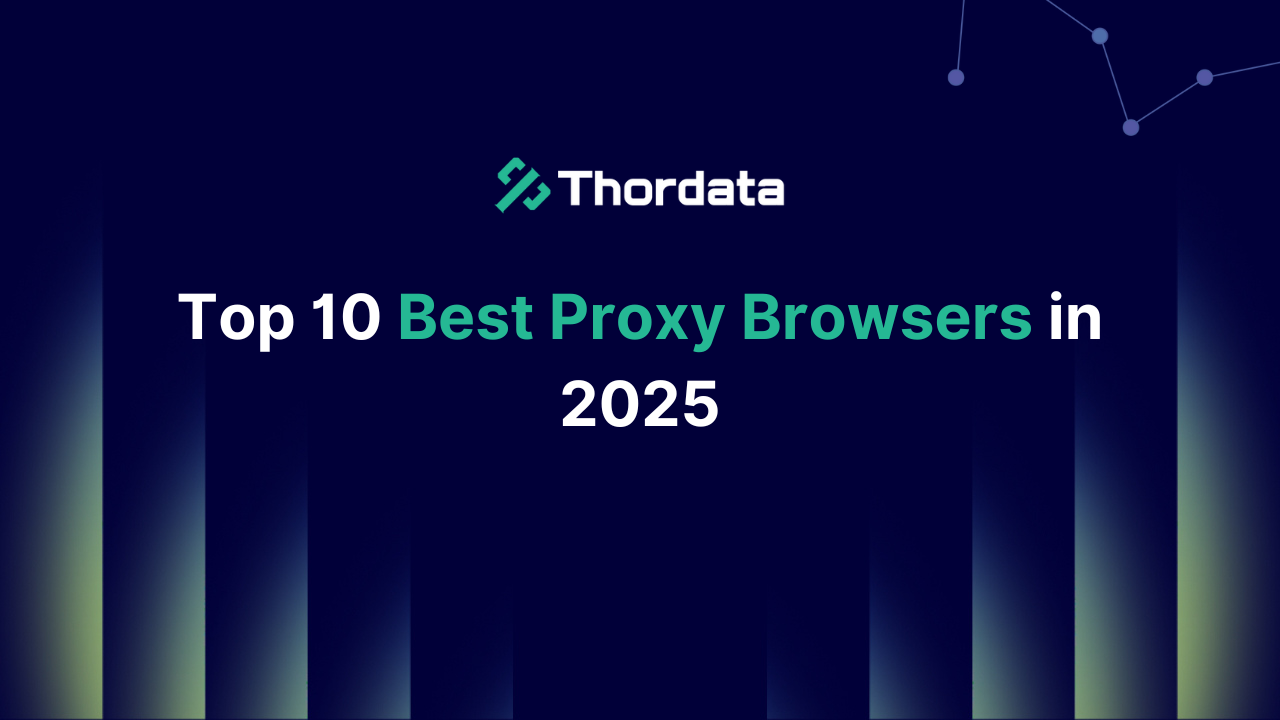Top 10 Best Proxy Browsers in 2025


Proxy browsers are powerful tools for protecting online privacy and security in 2025. These specialized browsers have gained significant attention among privacy-conscious users. Choosing the right proxy browser requires careful consideration of several factors. Each browser offers unique features, ranging from basic IP masking to advanced fingerprint protection.
This guide examines the top ten proxy browsers available today, breaking down their core functionalities and comparing their effectiveness across different use cases.
What is a Proxy Browser?
A proxy browser is a specialized tool that routes your internet traffic through an intermediary server, creating a barrier between your device and the websites you visit. These browsers have become essential for users seeking genuine online privacy and security.
Differences Between Proxy Browsers and Regular Browsers
Standard browsers like Chrome or Firefox connect directly to websites, exposing your real IP address and making your online activities traceable. Proxy browsers fundamentally change this connection model by adding an intermediary layer.
Connection Path:
Regular browsers create a direct connection to websites.
Proxy browsers route requests through an intermediary server before forwarding them to the target website.
IP Address Handling:
In standard browsers, your real IP remains visible.
Proxy browsers replace it with the proxy server’s address, masking your digital identity.
Data Handling:
Regular browsers render content locally.
Proxy browsers can compress traffic and filter content before delivery.
Privacy Mechanisms:
Standard browsers focus on content display.
Proxy browsers add request filtering, cookie management, and referrer blocking.
Top 10 Best Proxy Browsers in 2025
1. Tor Browser: Free Proxy Browser
Tor Browser remains the gold standard for privacy-focused browsing. This Firefox-based tool uses onion routing technology to route your traffic through multiple encrypted layers, creating a complex shield for your digital footprint. Your data is routed through volunteer-operated servers, providing strong anonymity.
Key Advantages
Tracker Blocking: Automatically isolates websites to prevent cross-site and ad tracking.
Surveillance Protection: Observers can only detect Tor usage, not specific browsing activities.
Anti-Fingerprinting: Standardizes user appearance, reducing device fingerprinting risks.
Operating Systems: Windows, Linux, Mac, and Android.
Free Plan: Completely free.
2. Brave Browser: Free Proxy Browser
Created by JavaScript founder and former Mozilla CTO Brendan Eich, Brave Browser stands out with its powerful “Shields” feature. This Chromium-based browser automatically blocks trackers, ads, and fingerprinting attempts.
Key Advantages
Shield Protection: Customizable blocking system targeting ads, trackers, cookies, and fingerprinting.
Temporary Storage: Innovative data partitioning isolates third-party data and auto-clears between sessions.
Bounce Tracking Prevention: Redirects bypass tracking parameters.
Operating Systems: Windows, Linux, Mac, Android, and iOS.
Free Plan: Completely free.
3. ixBrowser: Free Proxy Browser
ixBrowser stands out with its generous free profile creation service — a feature competitors often charge for. It offers enterprise-level multi-account management at no extra cost, catering to social media managers, marketers, and users needing independent browsing environments.
Key Advantages
Unlimited Profiles: Each profile creates an independent environment with a unique digital fingerprint.
Team Features: Free plan includes profile sharing and proxy management with team permission controls.
Fingerprint Protection: Each profile retains a distinct fingerprint, resisting detection systems.
Free Plan: Free forever, but proxies require extra payment.
4. Multilogin
Multilogin stands out with advanced fingerprinting mechanisms that fully mask browser fingerprints instead of merely disabling parameters. This comprehensive approach significantly reduces CAPTCHA encounters and is highly effective for cryptocurrency, advertising, affiliate marketing, ticket sales, e-commerce, and more.
Key Advantages
Low Detection Rate for Advanced Fingerprint Masking.
Encrypted Sessions and Password Hashing for High Security.
Easy Integration with Major Automation Tools.
Minimalist UI Focused on Functionality.
Operating Systems: Windows, Linux, Mac.
Pricing
Free Plan: 3-day trial, €3.99 for trial extension.
Starter: €29/mo — 10 browser profiles, 1 team member seat.
Solo: €79/mo — 100 browser profiles, 1 team member seat.
Business: €159/mo — 300 browser profiles, unlimited team members.
5. GoLogin
GoLogin is a fingerprint browser specializing in multi-account management, enabling users to manage multiple online accounts securely and conveniently. Each browser profile has a unique fingerprint, IP address, and user agent to avoid detection and bans.
Key Advantages
Generate Unlimited Unique Digital Identities.
API Support for Integration with Other Tools.
Focus on Team Collaboration and Process Automation.
Operating Systems: Windows, macOS, Linux, and Android.
Pricing
Free Plan: 7-day free trial.
Professional: $24/mo — 100 browser profiles.
Business: $49/mo — 300 browser profiles, 10 team member seats.
Enterprise: $99/mo — 1000 browser profiles, 20 team member seats.
Custom: $149/mo — 2000 browser profiles, 20 team member seats.
6. Dolphin Anty
Dolphin Anty stands out for powerful task automation. Its scenario feature turns repetitive processes into automated workflows, ideal for managing multiple accounts efficiently. It combines user-friendly design with advanced features.
Key Advantages
Bulk Account Management.
Synchronized Profile Control.
Massive Deployment Scaling.
Unified Cookie Handling.
Operating Systems: Windows, macOS, Linux.
Pricing
Free Plan: 10 free browser profiles.
Base: $89/mo — 100 browser profiles.
Team: $159/mo — 300 browser profiles.
Enterprise: $299/mo — 1000 browser profiles.
7. MoreLogin
MoreLogin excels in social media account management. It has protected over 5 million accounts with advanced fingerprinting technology. Its mobile-first design allows users to create multiple mobile profiles without extra devices.
Key Advantages
Flexible Permission Controls.
Profile Sharing Options.
Location-Independent Collaboration.
Secure Account Access Without Password Sharing.
Operating Systems: Windows, macOS, Linux.
Pricing
Free Plan: 2 free accounts.
Pro: $9/mo — 10 browser profiles, 2 team member seats.
Custom: Customized per user needs.
8. AdsPower
AdsPower is a top choice for e-commerce professionals. It enables users to create hundreds of virtual browser profiles, each with a unique fingerprint recognized as separate devices. It supports various industries, including e-commerce, affiliate marketing, and social media.
Key Advantages
Complete Profile Isolation.
End-to-End Encryption.
Granular Permission Controls.
Operating Systems: Windows, macOS, Linux.
Pricing
Free Plan: 2 free accounts.
Pro: $9/mo — 10 browser profiles, 2 team member seats.
Custom: Customized as needed.
9. Incogniton
Incogniton prioritizes efficient cookie and session handling. Its Cookie Collector tool prevents unauthorized cookie access, while human-like browsing patterns avoid automated detection flags. Developers benefit from extensive testing features.
Key Advantages
Independent Fingerprints.
Unique Identity Tags.
Cross-Profile Isolation.
Operating Systems: Windows, macOS.
Pricing
Free Plan: 10 free browser profiles.
Starter Plus: $13.99/mo — 10 browser profiles.
Entrepreneur: $20.99/mo — 50 browser profiles.
Professional: $55.99/mo — 150 browser profiles, 3 team member seats.
Custom Package: $55.99/mo — 500 browser profiles, 10 team member seats.
10. BitBrowser
BitBrowser is designed for cross-border e-commerce, addressing network operation challenges. It offers features like store management, ad placement, and store reviews, making cross-border e-commerce more efficient.
Key Advantages
Fingerprint Spoofing Technology.
User-Friendly Interface.
Multi-Account Security.
Supports Various Proxy Types.
Operating Systems: Windows, macOS.
Pricing
Free Plan: 10 free browser profiles.
Base: $10/mo — 50 browser profiles, 2 team member seats.
Custom: Customized per user needs.
Understanding Proxy Types and Integration
When choosing a proxy browser, it’s essential to understand the underlying technology. Different proxy types — Residential, Datacenter, and ISP — cater to various privacy needs, each offering unique advantages for specific use cases.
Residential Proxies
Residential proxies are considered the most reliable type of proxy technology. These proxies use real IP addresses assigned to actual users by Internet Service Providers (ISPs), creating a legitimate network signature that can bypass sophisticated anti-bot systems. However, there is a clear trade-off between performance and cost — residential proxies operate at consumer internet speeds and come with a high price tag.
Datacenter Proxies
Datacenter proxies take a different approach by operating from cloud infrastructure rather than residential networks. Their strengths include:
Superior Connection Speed: Ideal for tasks that require high bandwidth.
Lower Operational Costs: More affordable than residential proxies.
Simplified Scaling Options: Easily scalable for large-scale operations.
However, their commercial nature makes them easier to detect. Many security systems automatically identify and block datacenter IPs, limiting their effectiveness for sensitive operations.
ISP Proxies
ISP proxies use real IP addresses provided by ISPs, combining the high speed of datacenter proxies with the authenticity and anonymity of residential proxies. They are ideal for:
Bandwidth-Intensive Web Scraping Tasks.
Continuous Operations Requiring High Performance.
Lower Risk of Detection.
This makes ISP proxies a preferred choice for long-term, resource-heavy projects.
Conclusion
Proxy browsers have evolved into sophisticated privacy tools to meet diverse user needs in 2025.As you decide which proxy browser suits you best, consider what’s most important to you: speed, security.
We hope the information provided is helpful. However, if you have any further questions, feel free to contact us at support@thordata.com or via online chat.
Frequently asked questions
What Are the Main Benefits of Using a Proxy Browser?
Proxy browsers enhance anonymity by masking your IP address, provide access to geo-restricted content, improve browsing speed through caching, add a security layer against malicious content, and often include ad-blocking functionality.
How Do Free Proxy Browsers Compare to Paid Options?
Free proxy browsers typically offer basic privacy features but may suffer from slower speeds and less reliable connections. Paid options usually provide better security, faster speeds, more stable connections, and advanced features such as multi-account management and automation.
Are proxy browsers safe?
Proxy browsers can provide a degree of security and privacy, but their security depends on the specific browser and configuration used. Choosing a reputable proxy browser and understanding its privacy policy and security features are key to staying safe.
About the author
Yulia is a dynamic content manager with extensive experience in social media, project management, and SEO content marketing. She is passionate about exploring new trends in technology and cybersecurity, especially in data privacy and encryption. In her free time, she enjoys relaxing with yoga and trying new dishes.
The thordata Blog offers all its content in its original form and solely for informational intent. We do not offer any guarantees regarding the information found on the thordata Blog or any external sites that it may direct you to. It is essential that you seek legal counsel and thoroughly examine the specific terms of service of any website before engaging in any scraping endeavors, or obtain a scraping permit if required.